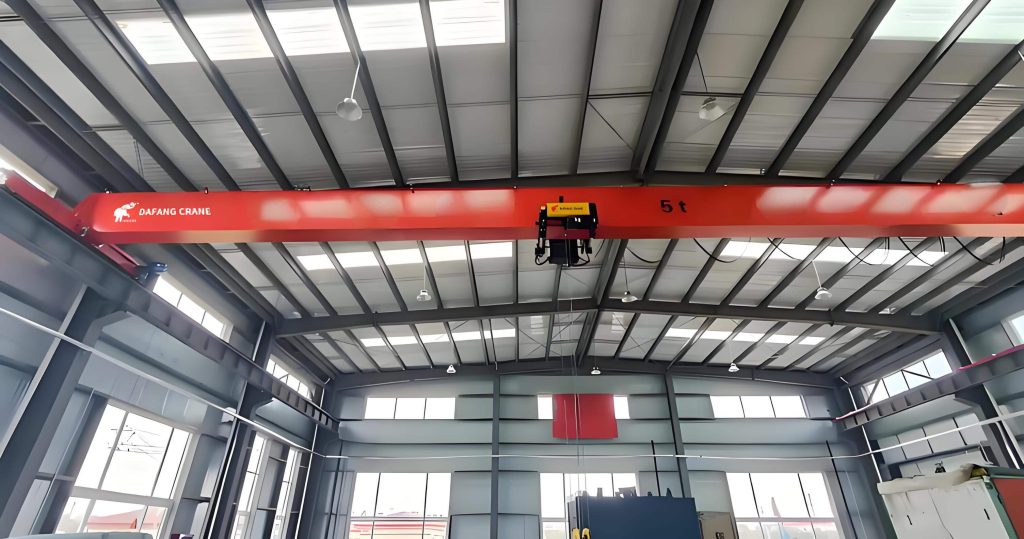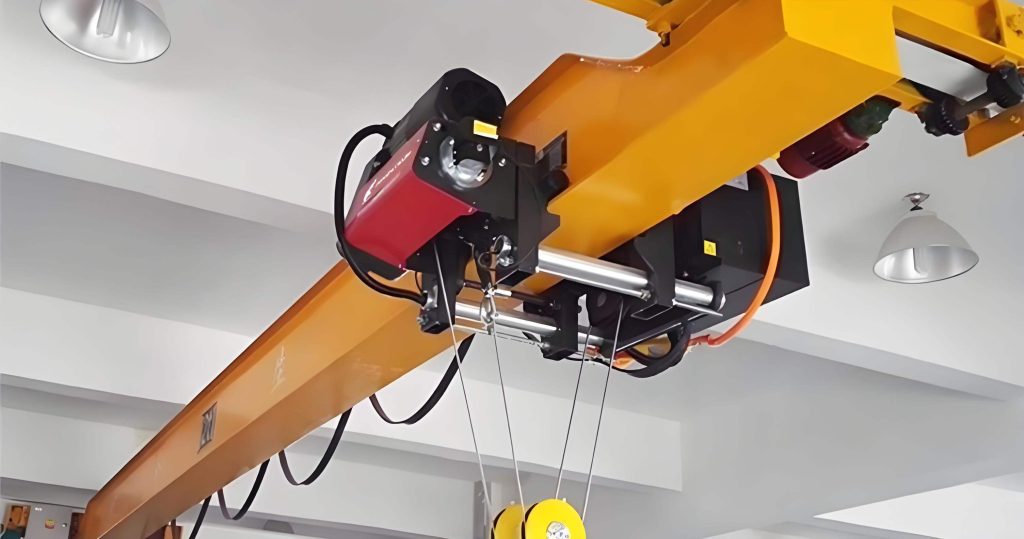Modular Design, Compact Structure, and Small Size
The low headroom electric hoist adopts a large diameter drum, effectively increasing lifting height while reducing lateral limits and crane blind spots. This design offers users more operational space, improving the overall efficiency of the workplace.
Maintenance-Free Design
The high-precision hard tooth surface reducer is pre-lubricated with internationally recognized brand oils, ensuring that no oil change is required throughout the product’s entire lifecycle. It also features internationally branded, maintenance-free wire ropes and high-strength nylon rope guides, which have transformed from consumable parts into durable components. The electromagnetic disc brake features automatic gap compensation, eliminating the need for maintenance.
Energy Efficiency and Noise Reduction
The motor power is reduced by 30% compared to traditional electric hoists, significantly improving energy efficiency. The mature application of frequency positioning technology increases work efficiency by more than 20%. Additionally, the overall noise level of the hoist is kept below 70 decibels, providing a quieter working environment.
Environmentally Friendly and Safe Design
The brake pads are designed without asbestos, ensuring environmental safety. The nylon rope guide and the sliding friction between the steel wire rope and the drum will not produce metal dust, providing workers with a clean and safe operational environment.


Electric hoists are ideal for assembly lines and material handling in industries such as automotive and machinery manufacturing. They allow for precise lifting of heavy components, improving assembly efficiency while reducing manual handling risks.
They support automated production lines and, when paired with overhead cranes and tracks, enable cross-zone material transfer.
For heavy equipment maintenance and installation, electric hoists allow quick lifting of parts during electromechanical repairs, significantly reducing downtime.
On construction sites, electric hoists are used for lifting materials such as rebar and concrete components, addressing the inefficiency and danger of traditional manual handling.
They are widely applied in high-rise building construction for vertical transportation of materials and equipment to upper floors.
In bridge and large-structure projects, hoists assist in the installation and positioning of steel components, adapting to complex construction environments.
Electric hoists enable quick loading and unloading of heavy goods in warehouses, optimizing space utilization and reducing labor costs.
When integrated with container-handling equipment, they boost operational efficiency in ports and logistics parks.
They are also used for loading and unloading cargo trucks and lorries, especially for bulk materials such as ores and industrial raw materials.
In mining and agricultural work, hoists assist in transporting ores and equipment, reducing worker fatigue.
On farms, they handle heavy items such as agricultural machinery and feed, increasing agricultural productivity.
Small factories use them to handle electronic components or handicrafts, reducing the risk of manual handling damage.
In explosion-proof and high-temperature environments, such as in the chemical and oil & gas industries, intrinsically safe electric hoists certified by ATEX and similar standards ensure reliable operation.
High-temperature-resistant hoist models are suitable for use in metallurgical and foundry workshops.
In precision control scenarios, variable-frequency hoists allow micro-speed lifting, which is essential for the installation of delicate equipment.
Small size and compact structure, suitable for environments with limited space, improving operational flexibility.
Adopt advanced motors and frequency conversion speed regulation technology to achieve smooth start and stop and improve working efficiency.
Key components are made of high-strength materials, specially treated, with excellent durability and corrosion resistance.


| Type | Load Capacity(T) | Lifting Height(m) | Lifting Speed (m/min) | Traveling Speed (m/min) | Lifting Motor Power(kw) | Rope Dia. (mm) | Group(ISO) | Rope Reeving |
| Single Girder | 3.2 | 6/9/12/15/18 | 5/0.8 | 20/5 | 3.2/0.45 | 7 | M5 | 4/1 |
| 5 | 6/9/12/15/18 | 5/0.8 | 20/5 | 6.0/0.9 | 9 | M5 | 4/1 | |
| 6.3 | 6/9/12/15/18 | 5/0.8 | 20/5 | 6.0/0.9 | 9 | M5 | 4/1 | |
| 8 | 6/9/12/15/18 | 5/0.8 | 20/5 | 9.5/1.5 | 13 | M6 | 4/1 | |
| 10 | 6/9/12/15/18 | 5/0.8 | 20/5 | 9.5/1.5 | 13 | M5 | 4/1 | |
| 12.5 | 6/9/12/15/18 | 5/0.8 | 20/5 | 12.5/1.9 | 13 | M5 | 4/1 | |
| Double Girder | 5 | 6/9/12/15/18 | 5/0.8 | 20/5 | 6.0/0.9 | 11 | M5 | 4/1 |
| 10 | 6/9/12/15/18 | 5/0.8 | 20/5 | 9.5/1.5 | 15 | M5 | 4/1 | |
| 12.5 | 6/9/12/15/18 | 5/0.8 | 20/5 | 12.5/1.9 | 15 | M5 | 4/1 | |
| 16 | 6/9/12/15/18 | 4/0.6 | 20/5 | 16/2.6 | 18 | M5 | 4/1 | |
| 20 | 6/9/12/15/18 | 4/0.6 | 20/5 | 16/2.6 | 18 | M5 | 4/1 | |
| 20 | 6/9/12/15/18 | 3.4/0.5 | 20/5 | 16/2.6 | 18 | M5 | 4/1 | |
| 25 | 6/9/12/15/18 | 3.4/0.5 | 20/5 | 16/2.6 | 18 | M5 | 4/1 | |
| 40 | 6/9/12/15/18 | 4.9/0.8 | 20/5 | 38 | 20 | M5 | 4/1 | |
| 63 | 6/9/12/15/18 | 3.3/0.5 | 20/5 | 38 | 20 | M5 | 4/1 |
1. Industry Position
Founded in 2006, Dafang Heavy Machine covers an area of 1,580 mu and employs over 2,600 people. With an annual sales revenue of 3.566 billion RMB, the company focuses on two main business sectors: lifting machinery and steel structures. Major products include single and double girder bridge and gantry cranes, electric hoists, steel structure bridges, prefabricated buildings, and industrial plants. Dafang serves critical sectors such as military industry, aerospace, nuclear power, offshore engineering, metallurgy, and mining. Its products are exported to over 100 countries and regions, including the United States, Russia, and Southeast Asia.
Annually, Dafang manufactures 30,000 single-girder cranes, more than 12,000 double-girder and gantry cranes, and 30,000 electric hoists. Based on production scale, sales volume, and brand recognition, the company ranks among the top three in China’s crane industry.
2. Core Technologies
Dafang’s R&D team consists of over 260 members, including 104 with senior or intermediate engineering qualifications. The company invests 3.8% of its annual sales into technology development. It has obtained 12 international invention patents, 50 national invention patents, 415 utility model patents, and achieved 43 scientific and technological milestones. Dafang was the first in the industry to adopt anti-sway and automatic positioning technologies.
In 2016, Dafang became the first enterprise in Henan Province to implement smart crane applications and to introduce remote monitoring technology. The company also developed the multifunctional brewing crane, filling a domestic market gap. In 2021, Dafang was the first in the industry to be certified for unmanned intelligent cranes. In 2022, it undertook a project for a tower crane at a commercial satellite launch site.
3. Manufacturing Capability
Dafang Heavy Machine is equipped with advanced in-house designed manufacturing equipment, including 1,500-ton press grooving machines, extrusion machines, and roller machines. The company has established leading domestic workshops, including an electrical assembly line, steel pre-processing line, paint finishing line, and China’s first practical single-girder lean production line. Precision machinery includes imported German NILES CNC gear grinding machines and Japanese MAZAK machining centers.
4. Service Assurance
Dafang upholds a “comprehensive, high-quality” service standard, providing users with fast, attentive, and thorough one-stop services. With 24/7 online support, choosing Dafang means complete peace of mind. Just tell us what you need—we’ll take care of the rest.
The rated load should be 20%-30% higher than the actual lifting demand (e.g., for lifting 3 tons of goods, choose a 4-ton model) to avoid overload risks.
For low-clearance workshops, compact designs with hook approach ≤400mm are preferred. Standard lifting heights range from 6 to 30 meters and can be customized as needed.
Triple protection is mandatory: automatic power cut-off for overload, dual mechanical and electronic limit switches, and an emergency braking system.
Wire ropes must be coated with rust-proofing, and the broken wire rate must be regularly inspected (replace immediately if it exceeds 10%).
Explosion-proof models must be certified with ATEX/IECEx standards. The explosion-proof grade should specify both the temperature class (e.g., T4) and gas group (IIB/IIC).
Transmission components must use bronze or nickel-alloy materials to prevent mechanical sparks.
Choosing IE3 energy-efficient motors can reduce power consumption by 30%. Frequency converters are recommended to be replaced every 5 years.
Our company provides full spare parts support, ensuring timely delivery of critical components such as gearboxes and brake discs.
Operators must undergo specialized technical training to be familiar with the safe use of the crane, understand its structure, and recognize common faults and potential hazards. They must be capable of performing correct responses in emergency situations.